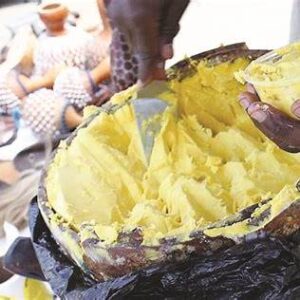In a strategic move aimed at maximising the potential of Nigeria’s shea industry, President Bola Ahmed Tinubu announced a six-month ban on the export of raw shea nuts. This bold decision, effective immediately, is designed to curb the export of unprocessed shea, encourage local processing, and position Nigeria to capture a larger share of the N10 trillion ($6.5 billion) global shea market.
By focusing on value addition within the country, the government seeks to transform Nigeria into a key player in the global shea industry, creating new opportunities for economic growth, job creation, and enhanced export revenues
Nigeria’s Shea Industry in a Nutshell
Nigeria stands as a global leader in shea production, accounting for approximately 69.8% of the world’s shea butter output.
The country produces an estimated 350,000 metric tonnes of shea nuts annually across 30 states, with the potential to reach nearly 900,000 metric tonnes if fully harnessed.
Despite this abundant production, Nigeria captures only about 1% of the $6.5 billion global shea market, a disparity that has prompted the government’s intervention.
Rationalizing the Export Ban of Shea Nuts
The primary objective of the export ban is to encourage local processing of shea nuts, thereby increasing the value derived from the commodity within Nigeria.

Currently, a significant portion of raw shea nuts is exported, with limited processing taking place domestically. By halting raw exports, the government aims to stimulate the establishment of local processing facilities, create jobs, and enhance the economic benefits derived from the shea industry.
According to Kelvin Ayebaefie Emmanuel, Co-Founder, CEO at Dairy Hills, “It will interest you to note that, in the financial year 2021, of the 42,500 metric tonnes of shea nuts exported (ten per cent of the 425,000 metric tonnes picked), Nigeria earned only $14.5m ($341 per metric tonne) for a commodity that, if processed into premium grade A butter and oil, can fetch as much as $13,000 per metric tonne on the international markets.
“The question is, why are we satisfied with proceeds that are only 2.6% of the total value that can be received if the commodity is fully explored?
READ ALSO: Tinubu Suspends Raw Shea Exports, Urges Value Creation in Nigeria
“The answer goes back to the source of the shea nuts. The farmers and villagers in the 17 out of 36 states in Nigeria that pick shea nuts operate in individual silos, sell to middlemen who act as brokers to international buyers, and report the figures through the Nigeria Customs Service to the government.
“Most of the villagers do not even know that shea nuts, when processed to premium grade A butter (that has a shelf life of 12 months), can actually be used as a Cocoa Butter Equivalent (CBE – an industry that has an annual trade value of $100bn globally).”
Economic Implications and Projections
The European market has strong potential for shea butter in food products. Europe has a large confectionery and bakery industry, with increasing demand for plant-based oils and fats. This is reflected in the growing European imports of these ingredients.
The most promising markets for shea butter are Denmark, Germany, France, the Netherlands, the United Kingdom, and Belgium.
Trends that further drive demand are that more people are choosing plant-based diets and that there is a growing demand for alternatives to cocoa butter.
Additionally, companies are moving away from using palm oil, and ethical, sustainable sourcing is becoming more important.
The European imports of plant-based oils and fats have increased over the last five years.
Trade data by Access2Markets shows that European imports amounted to 470 thousand tonnes and €1,200 million in 2023. Between 2019 and 2023, European imports grew by 1.7% in volume and 12% in value per year on average.
While this growth is lower than the average global growth of trade in shea, an expanding market does offer exporters opportunities.
The Nigerian government projects that the ban will generate approximately $300 million annually in the short term by boosting local processing activities and increasing the value-added exports of shea products.
The thinking is that, with the development of local processing capabilities, Nigeria could potentially generate up to $700 million annually from the shea sector, according to the Raw Materials Research and Development Council.
Challenges and Considerations
While the ban presents opportunities for economic growth, it also poses challenges.
The informal cross-border trade of shea nuts has been a longstanding issue, with over 90,000 metric tonnes of raw shea lost annually due to this trade.
Additionally, the establishment of local processing facilities requires significant investment in infrastructure, training, and technology.
The government will need to address these challenges to ensure the success of the policy.
What Needs to Change?
President Tinubu’s decision to ban the export of raw shea nuts marks a pivotal step towards enhancing Nigeria’s shea industry.
By focusing on local processing and value addition, Nigeria aims to capitalise on its position as a leading producer and increase its share in the global shea market.
The success of this policy will depend on effective implementation, investment in infrastructure, and support for local processors. If these factors are addressed, Nigeria could see substantial economic benefits from its shea industry in the coming years

Emmanuel said, “Just like the Cocobod in Ghana started a supply chain fight with European off-takers for the imperative to raise the price of a metric tonne of cocoa beans, more countries in Africa need to understand that it cannot unlock value, compensate its workers, industrialise the continent and strengthen its currency by selling its commodities, from shea nuts to crude oil, to cocoa beans and cotton, raw.
“The question is, how do you balance providing funding for companies that are in the secondary layer of the value chain with ensuring you create wealth for the villagers and farmers in the primary layer of the value chain?
“The answer lies in the willingness of the fiscal authorities at the state and federal government levels to not only provide access to patient capital and develop a seamless process for the exports of processed derivatives but also to develop frameworks that ensure farmers and villagers can unlock the benefits of being part of special purpose vehicles designed to distribute profits from turning a raw commodity into a valuable derivative, a model developmental economists and experts tag ‘social impact’.
Sunday Michael Ogwu is a Nigerian journalist and editor of Pinnacle Daily. He is known for his work in business and economic reporting. He has held editorial roles in prominent Nigerian media outlets, where he has focused on economic policy, financial markets, and developmental issues affecting Nigeria and Africa more broadly.















